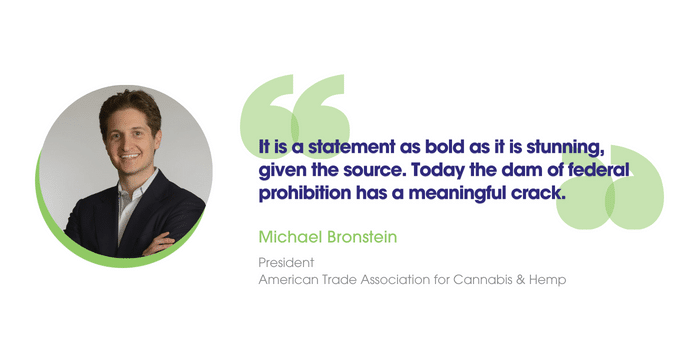Last week, the U.S. Department of Justice published a notice of proposed rulemaking that would shift cannabis from the Schedule I tier of drugs to Schedule III.
- There are five schedules of drugs established by the United States Drug Enforcement Administration.
- Schedule I drugs are considered to have a high potential of abuse and are the most restricted by U.S. laws.
- Other drugs that are currently assigned Schedule I along with cannabis include heroin and ecstasy.
- Cocaine, Methamphetamine, OxyContin and fentanyl are all Schedule II drugs with less restrictive policies applied to them than marijuana.
“This is monumental,” says President Joe Biden. “Today, my administration took a major step to reclassify marijuana from a Schedule I drug to a Schedule III drug. It’s an important move toward reversing long-standing inequities.”
The announcement comes after a review process requested by the Biden administration in October 2022 in which federal agencies reviewed whether marijuana’s Schedule I status was still appropriate.
“This view is what we as advocates have advanced for the last 20 years,” says Michael Bronstein, president of the American Trade Association for Cannabis & Hemp. “It is a statement as bold as it is stunning, given the source. Today the dam of federal prohibition has a meaningful crack.”

- In 2022, the Biden administration pardoned thousands of people convicted of marijuana possession under federal law.
- Forty-one states have medical marijuana programs, and it has been legalized recreationally in 24 states.
“Look, folks, no one should be in jail simply for using or possessing marijuana, period,” Biden says. “Far too many lives have been upended because of a failed approach to marijuana. And I’m committed to righting those wrongs.”
Promo Perspective
From a broad advertising perception, the President’s comments alone carry weight in the destigmatization of cannabis, potentially making it something that brands are more likely to want to associate with, a trend that has been in motion over the past decade.
More specifically, Ryan Tickle, VP of sales at supplier Cannabis Promotions, believes that rescheduling marijuana to a Schedule III drug will have specific financial ramifications for promo.
“I believe the extra revenue cannabis businesses will have for promos is going to skyrocket when cannabis is rescheduled,” Tickle says.

There will be domino effect of such a reclassification, including factors such as tax deductions, banking services and investment opportunities.
- Tax implications: Businesses that operate in the cannabis market currently face limitations on tax deductions under Section 280E of the Internal Revenue Code, which prevents any business selling Schedule I or Schedule II substances from claiming deductions.
“Rescheduling to Schedule III would allow these businesses to claim standard business deductions, potentially increasing profitability and encouraging growth and extra spend on advertising and promotions,” Tickle says.
- Access to greater banking services: Federal restrictions discourage many banks from offering services to cannabis businesses or cause banks to charge fees and high rates. Loosened restrictions will make credit card processing and loans more available to those businesses.
- Investment possibilities: Both the ramifications of rescheduling cannabis and the erosion of stigmatization toward marijuana in general could open up investors to a growing comfort in putting a financial stake in businesses that are no longer considered legally dubious.
“We are currently seeing rapid growth in the industry and in our sales and we expect that to continue with the rescheduling and the continued acceptance of cannabis around the globe,” says Tickle. “I highly recommend distributors that are not working in this industry to start as soon as possible, as its growth will only continue.”
Marijuana’s Legal Future
This rescheduling proposal also has some talking about an eventual complete federal legalization of marijuana. In such a scenario, specific regulations would likely be put in place for tax ramifications and otherwise.
Maia Szalavitz wrote in a column for the New York Times, that if legalized, marijuana advertising should be an aim of the government, suggesting that such policies should exist for alcohol.
“Marketing for all these substances should be far more restricted, if not banned entirely,” Szalavitz writes.
Estimates suggest that over $500 million is spent on alcohol advertising each year and any efforts to restrict such marketing have been unsuccessful.


